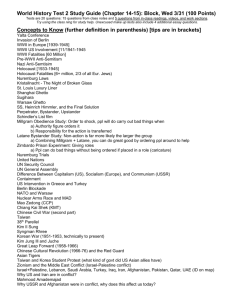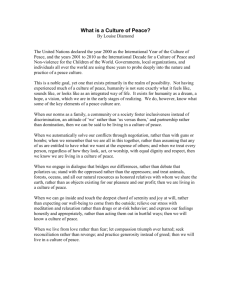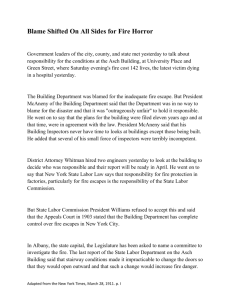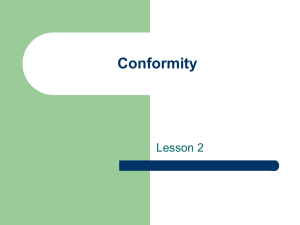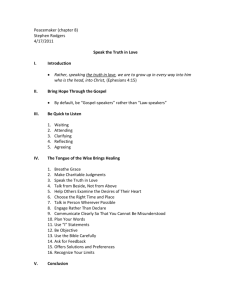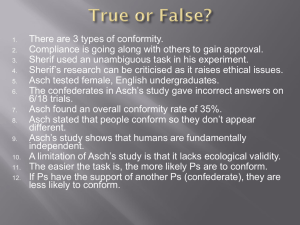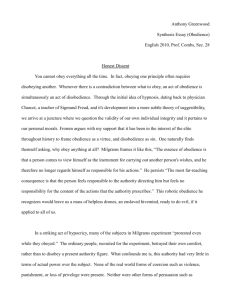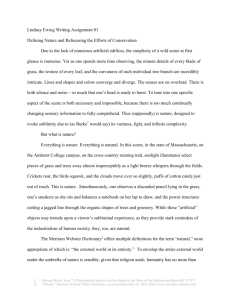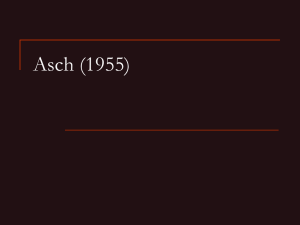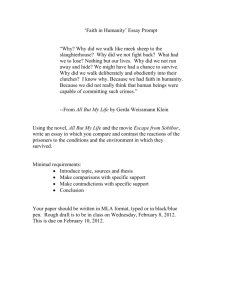Title Ordinary People Grade Level 7‐12 Time Period 1 class period
advertisement
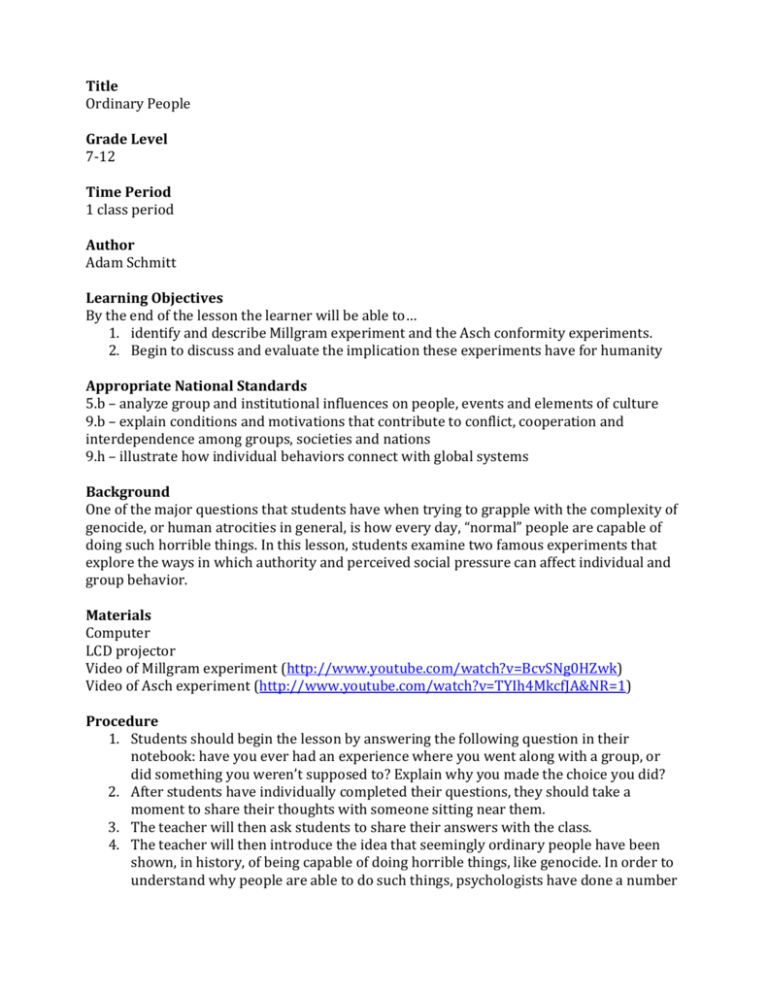
Title OrdinaryPeople GradeLevel 7‐12 TimePeriod 1classperiod Author AdamSchmitt LearningObjectives Bytheendofthelessonthelearnerwillbeableto… 1. identifyanddescribeMillgramexperimentandtheAschconformityexperiments. 2. Begintodiscussandevaluatetheimplicationtheseexperimentshaveforhumanity AppropriateNationalStandards 5.b–analyzegroupandinstitutionalinfluencesonpeople,eventsandelementsofculture 9.b–explainconditionsandmotivationsthatcontributetoconflict,cooperationand interdependenceamonggroups,societiesandnations 9.h–illustratehowindividualbehaviorsconnectwithglobalsystems Background Oneofthemajorquestionsthatstudentshavewhentryingtograpplewiththecomplexityof genocide,orhumanatrocitiesingeneral,ishoweveryday,“normal”peoplearecapableof doingsuchhorriblethings.Inthislesson,studentsexaminetwofamousexperimentsthat explorethewaysinwhichauthorityandperceivedsocialpressurecanaffectindividualand groupbehavior. Materials Computer LCDprojector VideoofMillgramexperiment(http://www.youtube.com/watch?v=BcvSNg0HZwk) VideoofAschexperiment(http://www.youtube.com/watch?v=TYIh4MkcfJA&NR=1) Procedure 1. Studentsshouldbeginthelessonbyansweringthefollowingquestionintheir notebook:haveyoueverhadanexperiencewhereyouwentalongwithagroup,or didsomethingyouweren’tsupposedto?Explainwhyyoumadethechoiceyoudid? 2. Afterstudentshaveindividuallycompletedtheirquestions,theyshouldtakea momenttosharetheirthoughtswithsomeonesittingnearthem. 3. Theteacherwillthenaskstudentstosharetheiranswerswiththeclass. 4. Theteacherwillthenintroducetheideathatseeminglyordinarypeoplehavebeen shown,inhistory,ofbeingcapableofdoinghorriblethings,likegenocide.Inorderto understandwhypeopleareabletodosuchthings,psychologistshavedoneanumber ofstudiesinvestigatingwhy.Today,studentswillbelearningabouttwoofthese experiments. 5. TheteachershouldfirstshowtheAschexperiment.Aftershowingthevideo,the teachershouldpauseandaskclarifyingquestionstoensurethestudentsunderstand whattheysaw.Questionscaninclude: ‐ Whatwasthisexperimenttesting? ‐ Howdidtheexperimentwork? ‐ Whatwerethefindingsoftheexperiment? Theteachershouldalsoanswerclarifyingquestionsthestudentshavebeforemoving on. 6. TheteachershouldthenshowtheMillgramexperiment,whichdemonstrates individuals’abilitytoimposeharmonastrangerwhentoldtobyaperceived authorityfigure.NOTE:theversionofthevideolinkedaboveactuallyhasthreeparts. Thetotalrunningtimeis16minutes.Inaddition,students(especiallyyoungerones) shouldbewarnedthatwhattheyseemaybeuncomfortableandiftheyneedto excusethemselves,theymay.Theyshouldalsoberemindedthatnopeoplewere actuallyharmedinthisexperiment. 7. AfterviewingtheMillgramexperiment,studentsshouldbeaskedthesameclarifying questionsasbefore. 8. Theteachershouldspendtherestoftheclassperiodengagingindiscussionaboutthe meaningofwhatthestudentssaw.NOTE:somestudentsmaycontinuallyinsistthat theywouldneverdosuchathing.Itisimportantthattheteacherremarkthatitis oftentimesimpossibletogaugewhatonewouldactuallydountilconfrontedwitha scenario.Discussionquestionscaninclude: ‐ Whatkindsofactionsdoyouthinktheseexperimentsweremeantto explain? ‐ Whatdoyouthinkarethelargerimplicationsoftheseexperiments? ‐ Doyouthinkit’srightforpeopletoexcuseharmfulbehaviorbysayingthat theyweretoldtodoitbyanauthorityfigure? ‐ Whatdotheseexperimentssayaboutfreewill? ‐ Howdoyouthinktheparticipantsadministeringtheshocksinthe Millgramexperimentfelt?Howcanyoutell?Whataffectdoesthefeelingof responsibility,orthedirectofrelationbetweenpersecutorandvictimhave onthepersecutor? ‐ Whatdotheseexperimentssayaboutfreewillandchoice? ‐ Howcanpeopleshiftguiltinordertoavoidresponsibilityfortheiractions? ‐ Whataresomeexamplesofthesefindingsinhistoryorcontemporary society? ‐ Howdosomepeopleresisttheinfluenceofsocialpressureandauthority? Whatareexamplesofthisresistancethatyouhaveseeninyourownlife (e.g.tolerance/acceptanceofthoseperceivedtobedifferentorstandingup tobullying)? ‐ Hasyourthinkingabouthumanitychangedatall?Why? 9. Theteachercanwrapuptheclassperiodbyaskingstudentstowriteareflectionfor homework. Assessment Studentsshouldwritea1‐pagereflectionontheirreactiontowhattheysaw,examplesthey canthinkofanditsgreatermeaningforhumanity,specificallyinregardstoviolenceand responsibility.
